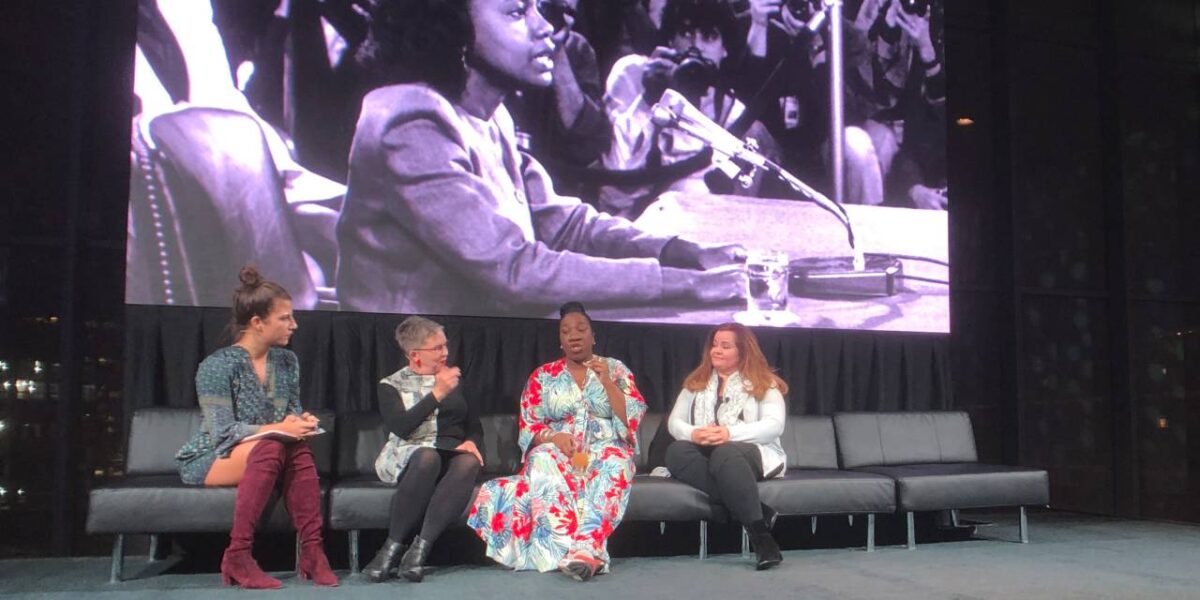Every 68 seconds, an act of sexualized violence occurs in the U.S. That’s over 1,350 acts each and every day, and nearly 500,000 in any given year.
For Tarana Burke, an author, civil rights activist and founder of #metoo, the rate at which sexualized violence in the U.S. constitutes a public health emergency — one that isn’t political or partisan, but rooted in human rights.
Appearing on March 10 at the 2023 South by Southwest (SXSW) Festival in Austin, Tx., Burke looked back at the legacy of #metoo while also exploring the future of the movement.
Speaking with Aliah Burman, the Chief Diversity Officer of Manhattan-based advertising agency TBWA Worldwide, Burke explained how social media and technology helped propel #metoo to what it is today.
Originally founded in 2006, the #metoo movement became a global campaign in 2017 in the wake of disgraced film producer Harvey Weinstein being exposed for years of perpetuating sexual violence against women. What made the movement so powerful, Burke says, was the overwhelming number of public figures who came forward and identified as survivors.
“The words ‘me too’ were really simple words,” Burke said, adding the term is stylized in lowercase to both speak softly and to indicate “something that is powerful, but still gentle.”
Originally branded as Empowerment of Empathy, the idea for #metoo ensured those who use the term can “tell their story without taking up a lot of space.”
‘It’s all interconnected’
Since Burke coined the term ‘me too’ nearly two decades ago, she’s seen a shift in the way people organize around social issues. Recognizing that empathy and healing can’t be achieved in a silo, Burke pointed to the cross-movement work between groups advocating for racial justice, a just transition, and immigrant rights, and how these initiatives intersect with the shared goals of each movement.
“It’s all interconnected,” she said. “And not for nothing.”
Burke hopes the movement can also emerge from the partisan attacks and recognize that when experts are talking about rape, there’s no opposite argument to be made.
“We are a movement about healing and action,” Burke said.
“One of the deep disconnects that I find, and this has been made really apparent to me in the last five years, is this lack of empathy,” Burke noted. “And this lack of empathy, that’s caused by, I think, patriarchy and sexism, and how deeply rooted it is in this country.”
The most common example of that disconnect, Burke added, comes when survivors speak out.
“That’s what empathy does,” she said. “When a person stands up to tell their story, they are not thinking about ruining somebody’s life, they are thinking about saving their own.”
Americans more likely to believe victims after #metoo: study
In just five years, the #metoo movement has led to a reckoning that’s changed the way society views sexual violence.
A 2022 study by the Pew Research Center found more than twice as many Americans support the #metoo movement than those who oppose it.
A key finding from the study showed that most Americans say that those who commit sexual harassment or assault are now more likely to be held responsible, while victims are also more likely to be believed.
Five years into ‘me too’, Burke continues to find hesitation and reluctance from businesses and corporations to endorse their message out of fears of not wanting to be political.
“Sexual violence is inextricably linked to all the major social justice issues that we’re dealing with today,” she said. “You cannot have a conversation about police brutality, mass incarceration, [or] racial injustice without talking about sexual violence.”
When it comes to making corporations and companies more equitable, Burke explained that business leaders must understand that diversity, equity and inclusion is not an initiative or a box to be “checked off.” Instead, it needs to be weaved through every facet of the business.
The same applies for sexualized violence in the workplace. It doesn’t just stop at firing a perpetrator, Burke noted. Businesses need to take a close, sober look at the environments and cultures created in these workplaces that let perpetrators think sexualized violence is acceptable.
Survivor Sanctuary and Act Too
Continuing to harness the technological success of ‘me too,’ organizers are working on accessible healing resources that can help point people in the right direction based on their age, gender, race and more.
The movement has also created the Survivor Sanctuary, an independent platform that revolutionizes the antiquated mission statements of 1-800 numbers. The website allows visitors to create a self-driven healing journey, with short video modules offering guidance and support.
Additionally, ‘me too’ has created a platform called Act Too for people who may not necessarily identify as survivors but want to take action to combat sexual violence in their communities.
Men and #metoo
When it comes to the role of men in the #metoo movement, Burke believes their primary role is as survivors.
“Every time we talk about men, they’re always only framed as a part of the solution or the perpetrator,” Burke explained. “I think one of the biggest mistakes that we’ve made… is that the movement has been framed solely as a women’s movement,” she said.
Burke attributes part of that framing to the timing of the movement going viral on the heels of the Women’s March in response to the Trump presidency.
“When there’s an act of sexual violence in our community, we need people to say ‘this community has to be safe,’” she said. “Sexual violence is a social justice issue. It’s a human rights issue.”



